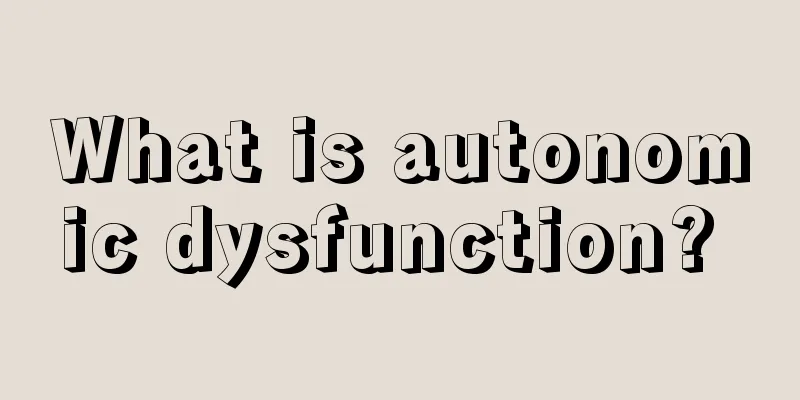What is autonomic dysfunction?

|
Mental stimulation: Everyone will encounter unpleasant things and everyone has experienced it, but not everyone will suffer from this autonomic dysfunction. I believe that autonomic dysfunction is a disease that we don't encounter very often in our lives. It is a disease caused by brain nerve dysfunction, which leads to weakened mental and physical activities. In terms of personality, most patients with this disease are inferior and sensitive, and have a relatively introverted personality. However, there are also a few patients who are more competitive and aggressive, but have very poor self-control. There are many cases of autonomic dysfunction and neurasthenia, which are very complicated and there is no clear cause yet. So what exactly is autonomic dysfunction? 1. Introduction Vegetative system dysfunction should be called autonomic nervous system dysfunction. It is composed of two major systems, the sympathetic nervous system and the parasympathetic nervous system. It mainly controls the myocardium, smooth muscle, visceral activity and glandular secretion. It is controlled and regulated by the cerebral cortex and hypothalamus and is not controlled by the will, so it is called the autonomic nervous system. In normal circumstances, the sympathetic and parasympathetic nerves of the human body, which have opposite functions, are in mutual balance and restraint. In these two nervous systems, when one side plays a positive role, the other plays a negative role, thus balancing, coordinating and controlling the body's physiological activities very well. This is the function of the autonomic nervous system. If the balance of the autonomic nervous system is disrupted, various functional disorders will occur. 2. Basic Concepts The autonomic spinal nerves originate from the spinal cord and are mainly distributed in the trunk and limbs, managing movement and sensation. The visceral nerves that originate from the brain and spinal cord are mainly distributed in the internal organs, controlling and coordinating the functions of the internal organs, blood vessels, glands, etc. Because it is not controlled by human will, it is called the autonomic nervous system, also known as the vegetative nervous system. Under normal circumstances, the sympathetic and parasympathetic nerves of the human body, which have opposite functions, are in a state of mutual balance and restraint. In these two nervous systems, when one side plays a positive role, the other side plays a negative role, which is a good balance, coordination and control of the body's physiological activities. This is the function of the autonomic nervous system. If the balance of the autonomic nervous system is disrupted, various functional disorders will occur. 3. The main symptoms are as follows: (1) Mental fatigue associated with mental excitability is manifested by increased associative recall, decreased mental workload, physical weakness, fatigue, etc. (2) Emotional symptoms include irritability, anxiety, emotional instability, worry, suspicion, anger, tension and fear, restlessness, and restlessness. (3) Sleep disorders are mainly manifested by insomnia, frequent dreams, fatigue, lack of energy, memory loss, lack of concentration, and slow thinking. |
>>: What are the methods for ripening bananas?
Recommend
How to wash hair when there is a wound on the head
The probability of having wounds on our skin due ...
Can vitamin B remove acne?
Vitamin B is a nutrient needed by the body. It is...
The most obvious symptom of laryngeal cancer in the early stage is hoarseness
The most obvious symptom of laryngeal cancer in t...
Daily care and health care for patients with lung cancer
The daily care and health care of lung cancer pat...
Can leg raises help slim down your legs?
Leg raising is an exercise that targets the knee ...
What is the reason for the dull pain under the ribs on the right side of the back
If you feel dull pain under the ribs on the right...
How can I cut onions without irritating my eyes
Onions are delicious and have high nutritional va...
How to correct crooked fingers
Normal people's fingers can be straightened, ...
What are the misunderstandings in the treatment of fibroids
What are the misunderstandings in the treatment o...
Four points to note in daily life to help you prevent pancreatic cancer
To prevent pancreatic cancer, we need to do some ...
What are the symptoms before death of advanced lung cancer? There are 3 symptoms before death of advanced lung cancer
Lung cancer is a type of cancer with a high morbi...
Why is my head cold and I'm sweating?
For some babies, they may experience problems wit...
What are the methods of making soup medicine
There are many kinds of diseases in our lives. Di...
Can physical sunscreen reduce inflammation?
We all know that in summer, the weather is extrem...
Common treatments for breast cancer 6 dietary methods for treating breast cancer
Breast cancer is a common disease in life, and th...









